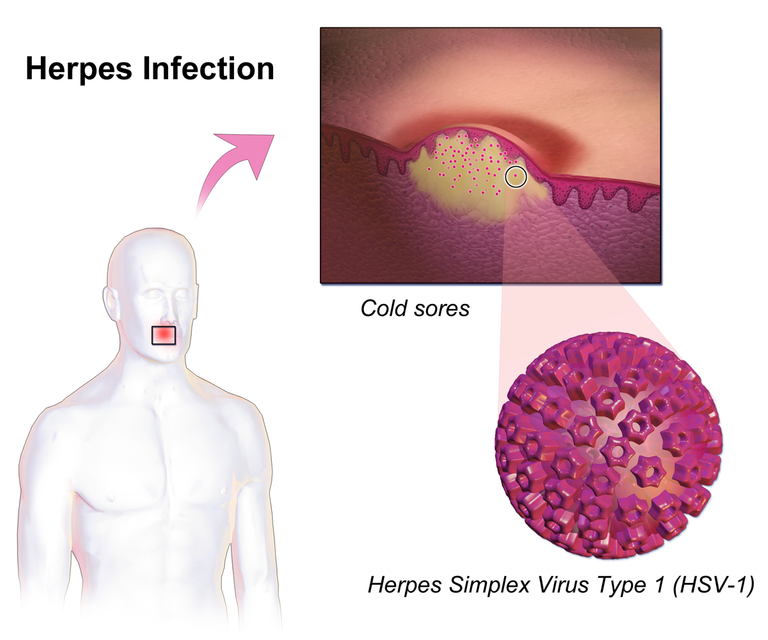Herpes Simplex Virus - The Oral and Sexually Transmitted Infection
There are a lot of sexually transmitted diseases and a handful of them are not treatable ranging from hepatitis B, herpes simplex virus (HSV), HIV and human papillomavirus (HPV). The one I will be talking about today is the Herpes Simplex Virus. Herpes is a transmittable virus that manifest on the skin as vesicular lesions caused by Herpes Simplex Virux type-1 or Herpes Simplex Virus Type-2 but basically HSV-1 is very common with the sores around the mouth and the lips which is often called Cold sores (Labial Herpes) or fever blisters while HSV-2 is associated with sores in the genitals and it is referred to as Genital Herpes.
Contraction of Herpes Simplex Virux type-1 (HSV-1) is through oral secretion contact such as from kissing, and through sharing other oral items. HSV-1 can be spread even without having lesions in the mouth, and we cannot really classify it as a sexually transmitted infection but Herpes Simplex Virux type-2 (HSV-2) can be regarded as a sexually transmitted disease as it is contacted through direct contact with the genital of an infected person but then it is important to know that HSV-1 can be found in the genital region, while HSV-2 can be found in the mouth as both viruses have been cultured and detected and this is possible through oral forms of intercourse. Herpes can also occur attacking the hand known as Herpes Whitlow, it can also affect the eye known as Herpes Keratitis.
About 3.7 billion people below the age of 50 years have herpes simplex virus type 1 (HSV-1), and about 491 million people within the age of 15 and 49 years have HSV-2 worldwide. It is a large dsDNA virus with an Icosadeltahedral capsid. Its transcription and protein synthesis proceeds in a coordinated and regulated manner in immediate early protein, early proteins, and late proteins phases.
It is very difficult for our immune system to fight herpes causing multiple flares which comes and go continuously. This is because when a person gets infected by herpes virus, it colonizes the epithelial cells which makes up the surface of the skin and the mucus membrane where they start to replicate. The virus then goes to sensory neurons then to sensory ganglion which is the trigeminal ganglion in oral infection and the Sacral Ganglion in cases of sexual infections. In the ganglion. part of our immune responses are destroyed and the is why a lot of people will continue to experience sores that heal up and come back again. When the virus is in the epithelial cell and the mucus membrane, it is asymptomatic and at some point it can be symptomatic where painful vesicular lesions are visible, also malaise, headache, fever, and swelling lymph nodes and this is known as primary infection. These symptoms begin to manifest after 2 to 12 days of exposure. After the primary infection is the latent phase of the infection where the virus goes to the sensory ganglion.
The body tries to heal the skin lesions but then there are always recurrent of the lesions, and this is possible as a result of immunodeficiency, fever, and stress where the virus leaves the sensory ganglion back to the mucus membrane and the skin to infect it and start to replicate. This can lead to people experiencing prodromal symptoms which are pain, tingling, and itching that would occur before the blisters are formed.
While this virus cannot be cured, there are ways to treat the lesions and antiviral drugs such as Valacyclovir, Acyclovir, and phamcyclovir. These drugs help to slow down the replication of the virus. Viral drugs target the viral encoded DNA-polymerase which is responsible for the replication of the virus.
https://www.ncbi.nlm.nih.gov/books/NBK8157/
https://www.who.int/news-room/fact-sheets/detail/herpes-simplex-virus

Thanks for your contribution to the STEMsocial community. Feel free to join us on discord to get to know the rest of us!
Please consider delegating to the @stemsocial account (85% of the curation rewards are returned).
Thanks for including @stemsocial as a beneficiary, which gives you stronger support.